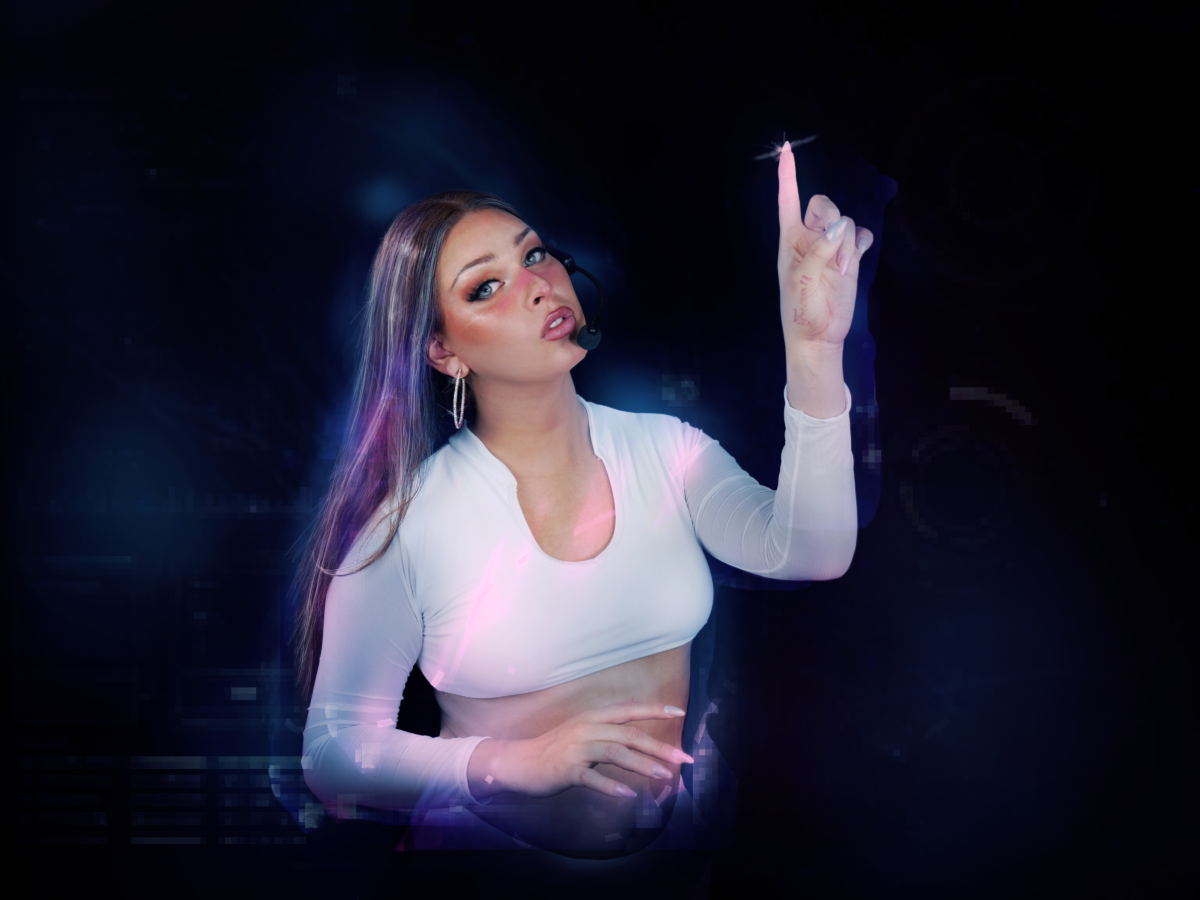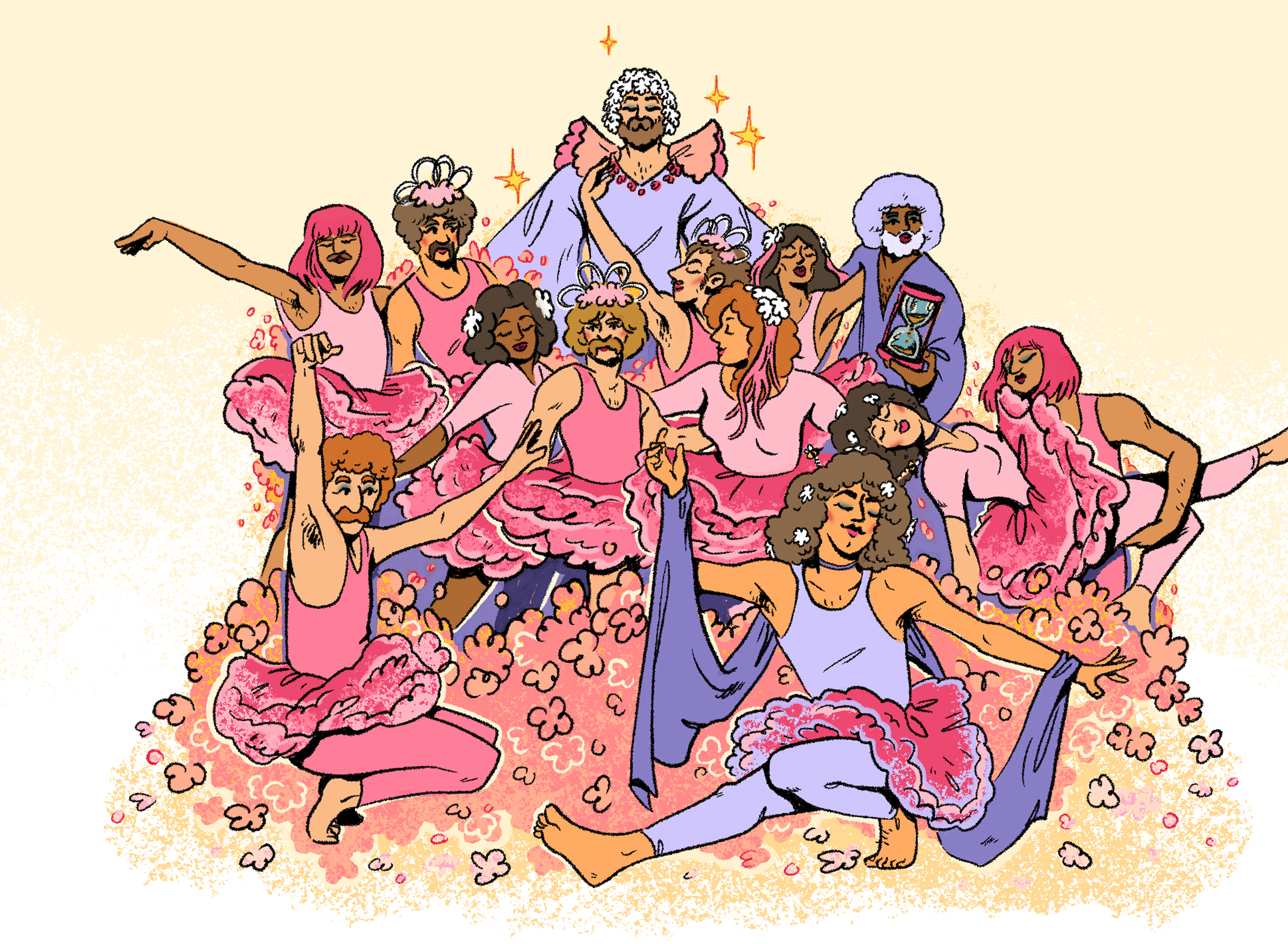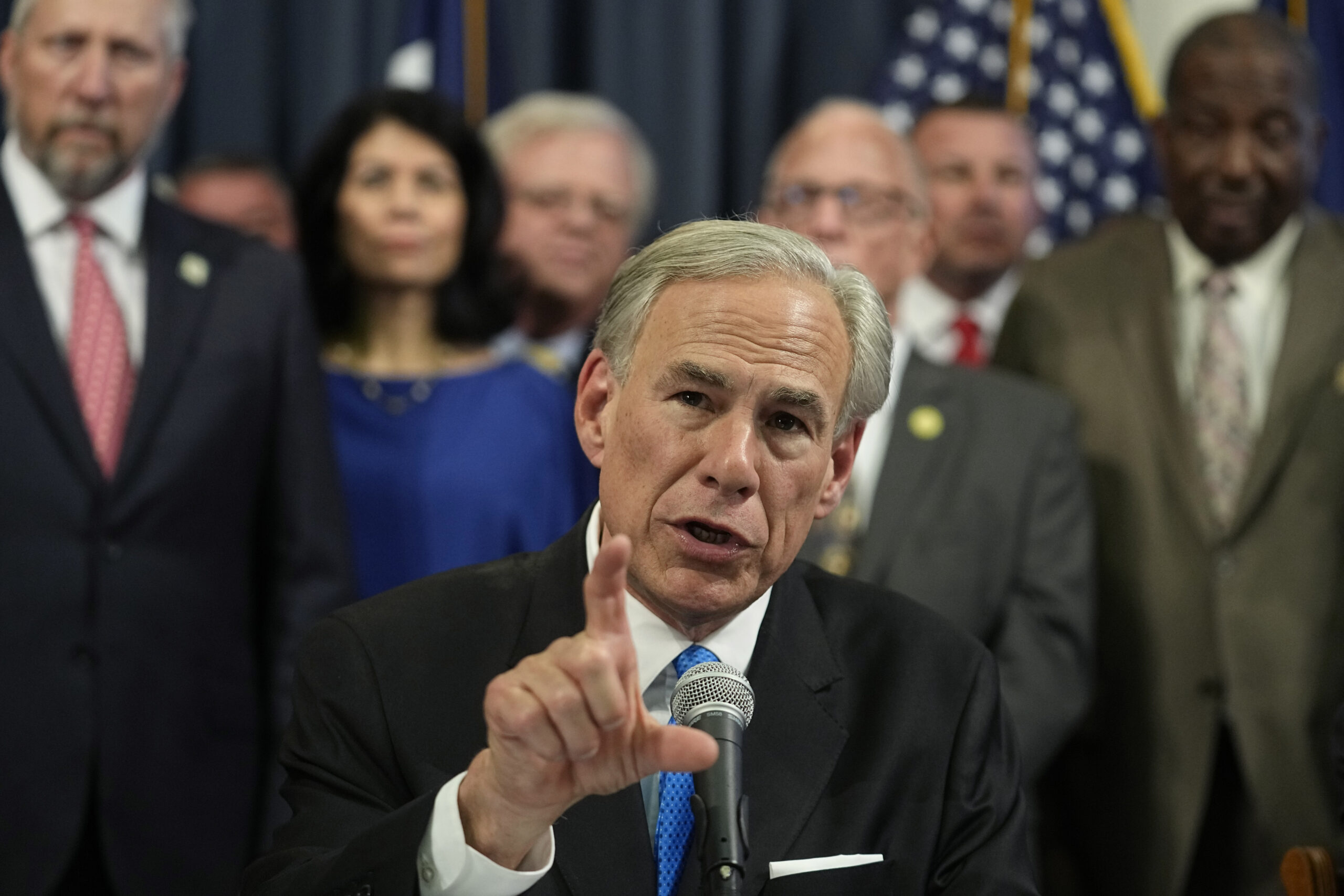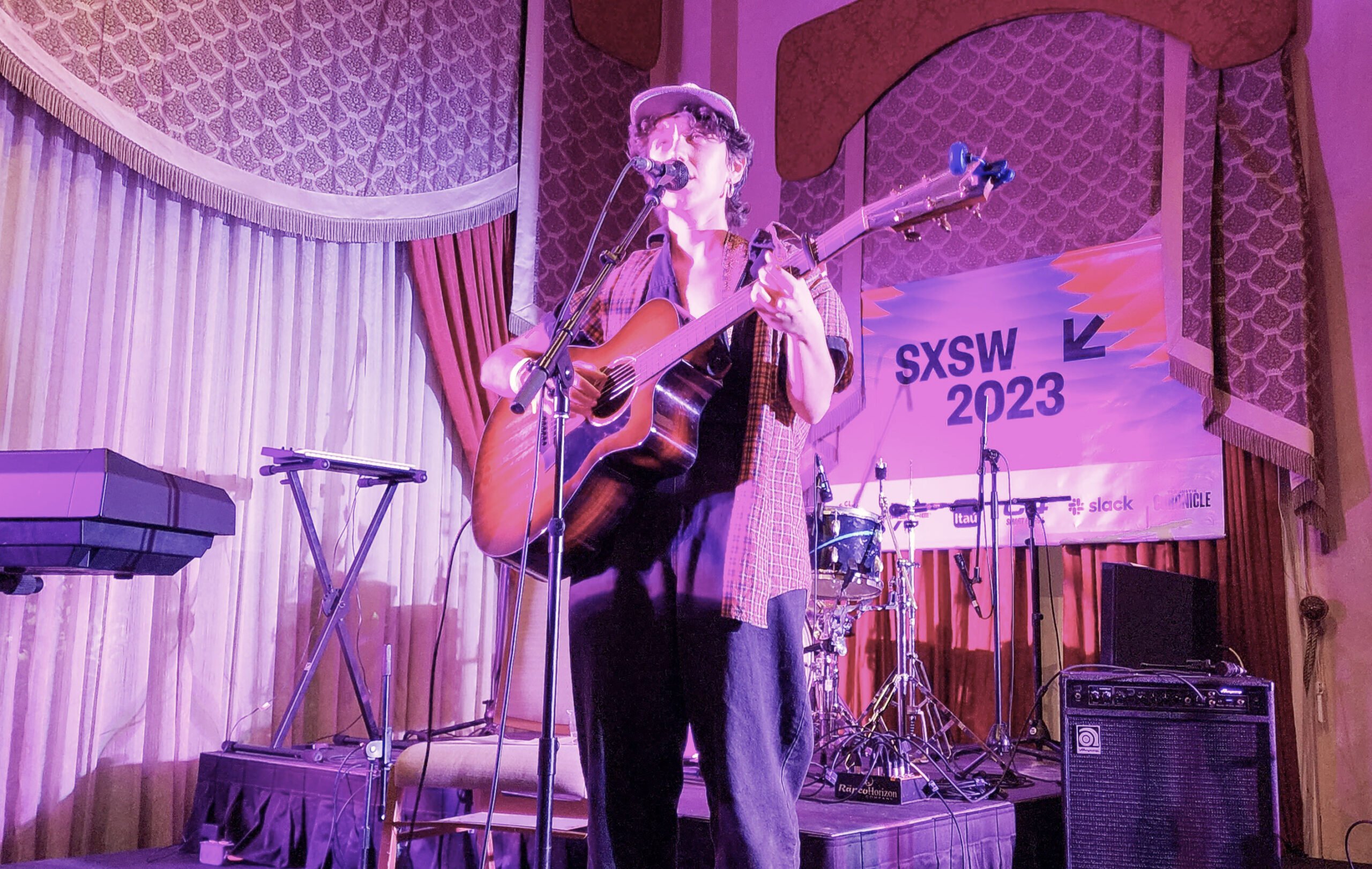
Austin Performer p1nkstar Is Creating New Worlds as a Trans Musician
The groundbreaking musician presents pop music that centers trans women and femmes.
“Here we are in my dreams,” sings a figure in glowing, purple light. Her voice, lilting over a chorus of low electronic tones, is filtered through vocal effects that tune her voice to an uber-high octave, like an angelic bionic woman. She’s dressed in all white, wearing a leather corset, lace-up platform boots, a petticoat, and a visor face shield with metal points. Androgynous dancers wearing medical masks and precious little else revolve around her. “Here we are in my dreams. Nothing ever as it seems. I can be who I want here.”
This is the creative world of p1nkstar in her live music video, “Girls Like Us.” It’s a vision of boundary-pushing pop that centers trans women, non-binary folks, and trans artists of color. p1nkstar, a fixture of queer nightlife in Austin, is known for events where she invites audiences to join an otherworldly party and bask in a queer utopia. “Girls Like Us,” her latest release, was livestreamed in January as an hour-long concert with a high production quality but a low budget. The video featured her music, and that of six other young trans artists from across Texas.
Since moving to Austin from Mexico in 2014, p1nkstar has become an LGBTQ+ icon in town. Her music proposes a science fiction-inspired future in which trans people live freely and joyfully. In addition to making music, p1nkstar, along with her main collaborator and life partner, Y2K, advocates for queer and trans artists of color and inclusive spaces within Austin’s predominantly white and straight music scene. By producing her own events, pushing promoters for better pay for performers, and bolstering more bookings for trans and POC artists in Austin’s venues, p1nkstar has pioneered a sort of advocacy work that’s as scrappy and DIY as her productions. Sometimes, when she hosts an event, she pays musicians out of her own pocket, she says.
Fans flock to her because she’s a spectacle; a maximalist; a fun, exciting performer. Her music is difficult to categorize, bouncing between American pop, electronic music, reggaeton, underground Latin pop, and “hyperpop” (an increasingly popular genre exemplified by artists like Charli XCX, Dorian Electra, and SOPHIE). And her persona has always been an ambitious experiment: Becoming an icon was part of the plan.
While her stage presence can be a force, p1nkstar, 26, is bashful and giggly off stage, with her eyes often cast downward and her mouth in a constant soft smile. Ever since she transitioned, her friends simply call her Pinky. She graduated from the University of Texas at Austin in 2018, where she designed her own honors bachelor’s degree called Queer Performance and Online Media. She was still mostly experimenting with digital and performance art within the classroom when a mentor, performance artist Emily Lowe, encouraged her to start performing at parties. During her last two years of college, she says she was living a double life: school during the day and performances, DJ sets, and raves at night. That’s when she crystallized the persona and style of p1nkstar.
“I had always been interested in stardoms,” she says. She bills herself as “ur fave electr0nic pop superstar,” and says “ur” is the key word there. “Especially in American pop culture, the pop superstar is like a saint or an icon, almost superhuman,” she says. “How would a hyper-queer pop star exist in the world as an everyday person?” She wanted to know what that person would do, where they would go, what they would wear. So she stepped into the role. “Things just kind of happened, and I became a pop star.”
The persona was initially a rebuke to her community and culture in her hometown of Tampico in the Mexican state of Tamaulipas, a port city about 300 miles south of the Texas border. “At the beginning it was a big ‘fuck you’ to all these values and standards I grew up around,” she says. “[People] thought it was pretty scandalous.” Rebelling against homophobic and transphobic “machista” values, p1nkstar says the new persona felt like a form of protection from a harmful ideology. “I was using the idea of the pop superstar who’s beyond human as a shield,” she explains. “It’s art, it’s pop, it’s not interacting in the same world as other people.”
Over time, however, as p1nkstar got to know more creatives and queer people in the Austin area, her new community became her primary audience. That didn’t happen overnight, and it happened out in the city more than within UT’s walls. “It was hard for professors to understand what I was doing,” she told me, noting that she never had a Latinx professor and had few queer professors. “I was speaking to a culture that no one in the department understood except for me.”
View this post on Instagram
Yet in other areas of academia, the rich tradition of queer nightlife is considered an entire subject of study. p1nkstar’s work is part of the research of Mac Irvine, a PhD candidate at Tufts University who received their master’s degree in gender studies from UT Austin. “Queer spaces are so important to people’s lives and people’s livelihoods… Pinky is really invested in making those other spaces, and puts in the work to do it,” Irvine says. According to Y2K, “A lot of our work is creating these whole new worlds where we [trans folks] thrive and you really see that in her work.”
The sudden halt of live music in Austin last year because of COVID-19 was tough. “I spent like six months mourning,” p1nkstar says. “I get so much inspiration from seeing all these beautiful queer people celebrating each other and spending time with other, and this vibrant community that we have in Austin. … It’s hard to not have that.”
Before the pandemic, p1nkstar sported a mustache, which she described as an intentional visual nod to gender nonconformity. But in the last year, she says she’s been sticking to more traditional gender norms. “If you go to the club, and you’re gender nonconforming and beautiful, people appreciate it, but if you go to Wal-Mart, people don’t appreciate it,” she explains, laughing. Masks, since they obscure her face, sometimes help her feel safe. “I just want people to not stare at me when I’m buying groceries, like, it’s fine, y’all!”
Being noticed in public can be dangerous for trans folks, and is the reason queer spaces have historically come to life after dark. “Trans people, and specifically trans women, have always been living at night, just because it’s safer,” she says. “I’m a person who doesn’t really exist in daylight.”
Currently in the middle of her own transition, she hasn’t minded hibernating a bit this year, though. She’s hoping to release new music in 2022. For the rest of this year, her main goal is to keep working on technical skills with sound, and she jokes, “to get really hot.”


